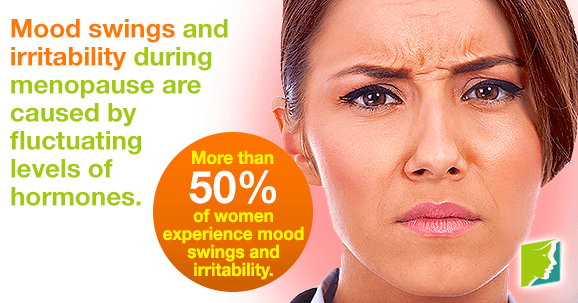Mood swings and irritability are particularly unsettling symptoms of menopause that affect as many as 50% of American women during this time of their lives. They can cause emotional upheaval and have a significant impact on a woman's life and particularly her personal relationships. As they can be difficult to diagnose, many women suffer needlessly and are unaware of the numerous solutions and treatments available that can help relive these unfortunate menopausal side effects.
About Mood Swings and Irritability
Mood swings and irritability during menopause are caused by fluctuating levels of hormones that in turn cause serotonin - the chemical in the brain that determines emotion - to rise and fall. These swift changes in serotonin levels have a big impact on a woman's state of mind and emotions, often leading to rapid changes in mood, increased irritability, or irrationality.
In many cases, women experience reactions or feelings out of proportion to the circumstances that trigger them. This is one of the more difficult, but most definitive, aspects of distinguishing mood swings related to menopause and not just a normal shift in feelings caused by external stimuli. The intensity of the moods and level of irritability are another factor that distinguishes the menopausal nature of these feelings, as they are generally more intense and prolonged.
Causes of Mood Swings and Irritability
Mood swings and irritability can be caused by a variety of factors that vary from general circumstances in life, to mental illness such as depression or anxiety, to more chemical-based causes like menopause. Other causes include a variety of medical conditions, such as:
- Thyroid issues (hypothyroidism or hyperthyroidism)
- Insomnia
- Medications (any hormone-based drugs can cause emotional imbalances)
- Strokes or other neurological issues
Mood Swings and Irritability Treatments
Mood swings and irritability can, unfortunately, have a detrimental effect on a woman's life and her relationships. Fortunately, there are plenty of options for women who want to regain control of their emotions. Treatments include psychological, physical, and pharmaceutical approaches. Also, there are several different types of medication that may have an impact on stronger or more chronic cases of mood swings and irritability. For those not wishing to use synthetic hormones or if these medications are incompatible with particular patient needs, there are several natural herbal remedies, which some women prefer to use.
Please read more about mood swings.Sources
- Amin, Zenab, Turhan Canli, and C. Neill Epperson. (2005). Effects of Estrogen-Serotonin Interactions on Mood and Cognition. Behav Cogn Neurosci Rev, 4, 43.
- Dennerstein, L., & Soares, C. (2008). The unique challenges of managing depression in mid-life women. World Psychiatry, 7(3), 137-142. Retrieved from http://www.ncbi.nlm.nih.gov/pmc/articles/PMC2559916/
- Love, Susan, and Karen Lindsey. Dr. Susan Love's Menopause and Hormone Book. New York: Three Rivers Press, 2003.
- Molecular Psychiatry.(n.d)."Estrogen Promotes Gender Difference in Brain's Response to Stress". Retrieved from www.psycheducation.org.
- Is Menopause Causing Your Mood Swings, Depression or Anxiety? (n.d.). Retrieved July 22, 2015.http://health.clevelandclinic.org/2015/06/is-menopause-causing-your-mood-swings-depression-or-anxiety/




